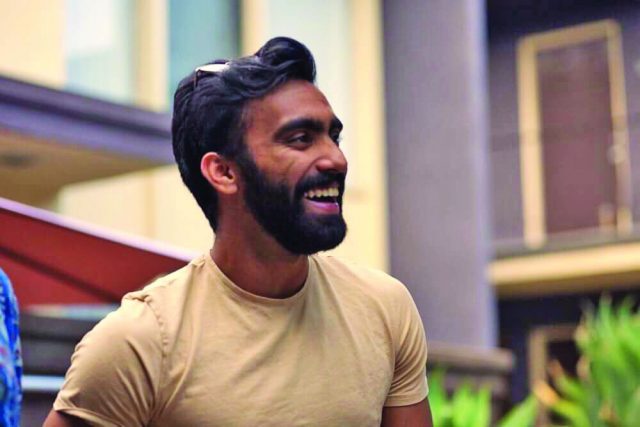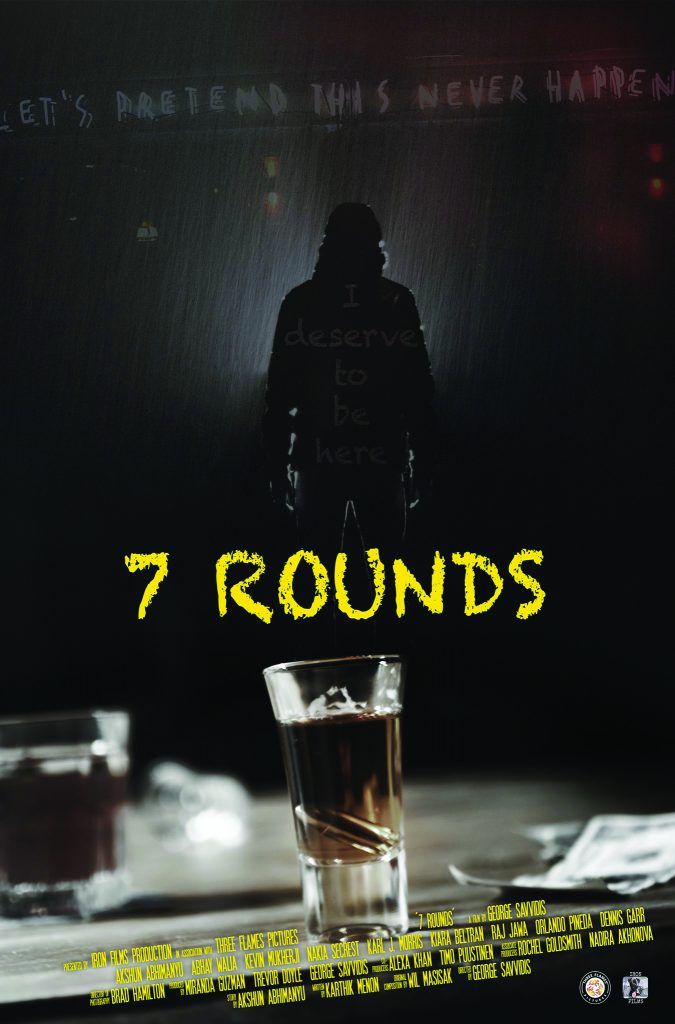Get candid with Karthik Menon, an aspiring screenplay writer who sheds light on pressing global issues.
By Christy Lau
Karthik Menon is a talented young screenplay writer, whose most recent short film, 7 Rounds, just got selected to be screened at the Cannes Short Film Festival that will take place from May 8th to 19th, 2018. A graduate of the New York Film Academy, he spent an exciting 2017 freelancing as a screenwriter in Los Angeles, California. Currently exploring the scene in Dubai, he plans to return to Hollywood in the next few years, eager to make his mark on the industry. Masala gets the scoop on this rising talent.
What inspired you to get into filmmaking?
Filmmaking sort of fell into my lap. I had always enjoyed penning down short fictional pieces during my free time, and my critiques extended only as far as a couple of friends and family. They told me I had a very visual sense when I wrote, but to me, it was just a hobby and nothing more. It wasn’t until the end of my Bachelor’s Degree, when I realised that I wasn’t quite happy with where I was in life.
I was doing a lot of content writing for different companies and social media pages, but my heart was always fixated on fiction. That’s when I decided to take a leap and move to LA to pursue my Masters in Screenwriting. Movies had always been a huge part of my life, and I can’t exactly point towards a single movie, or a single director, but I knew this was one way my writing could reach a global audience. I wanted to share my views, and if I could do that while entertaining people, why the hell not? It was my calling and it just took me a while to realise it. Better late than never!
What do you enjoy about screenplay writing?
I’ve always believed that a screenplay is the blueprint to a film. The more precise the blueprint, the more solid the structure. It’s exciting if nothing else. You get to create your own characters and world, where you could make them do whatever you want them to do. For those few hours or days, you actually feel like you almost rule the world. However, if the screenplay is weak, it does not matter how much money you put into a film, or how well you shoot or direct, it will all be a waste.
7 Rounds is about a racially-driven incident that happens in a bar. What message were you trying to get across and why do you think this is such an important issue to highlight?
It was definitely a controversial topic to work with. It was inspired by a hate crime that occurred in February 2018 at a bar in Kansas. Our main aim was to shed light on how the current political climate, and rhetoric being used by the current government, is beginning to significantly cause a racial distress not only in America but also globally. It’s a country that has struggled with racism for years, but you’d be a fool not to admit that there was definitely some level of progress over the past decade or so. Now suddenly, it feels like we’re travelling back in time, and since three people involved in the production are immigrants in America, we felt like we should be the ones to send this message across. I think the success of this movie is purely based on its message, that with a slight amount of racial tolerance, all of this blood, gore, sadness and hate can come to an end. We wanted people to question if it’s really that hard to care and value someone’s life, without basing it on their skin colour or religion.
How did the screenplay writing process for 7 Rounds work? How many people were involved?
Initially, it involved three people, both of whom are very close to me. One of them was the lead actor, Akshun Abhimanyu, and the other was George Saviddis, the director of the film. Akshun pitched me the idea of the incident that had taken place in Kansas, and George happened to be my best friend, and coincidentally a fantastic director, so we got him on board. Together, we used the incident as inspiration, and developed the characters and plot points. Once we had a decent outline, I penned down the entire screenplay.
Did you expect your film to be selected for the Cannes Short Film Festival? How did you find out?
Well we were very proud of the final product, but Cannes — that was something we laughed about a couple years back. It was the day after I landed in Dubai when I got the call from George at around 3am. I missed the call, but it woke me up, and I noticed my notifications had blown up. It was unreal. For the longest time, I was convinced that the jetlag was playing mind games with me.
What’s your eventual goal? Do you want to move into proper movie-making or continue with short films?
I want to do both. I mean I can speak for most filmmakers out there when I say that short films are a stepping stone, and if you have a chance to make a full-length feature, you’re not going to deny that opportunity. With that being said, short films are extremely underrated. Just because it lacks the commercial success, doesn’t mean it’s not “proper movie-making”. As a writer, it is far more challenging to convey a message in 15 minutes, than in two hours. Short films for me, are pure, personal, and often way more artistic and powerful than half of the commercial feature releases out there.
You’ve written other screenplays for Fated (2017) and Spice Affair (2017), among others. Where do your ideas come from?
Most of my work that has been produced in LA has been work for hire. I’ve had directors/producers approach me with a certain concept, after which I retreat into my bat cave for a week or so, and attempt to make it come to life. When it comes to writing about my own ideas, it just sort of happens. An idea can come from what I am reading, watching, or even during a conversation — that’s the exciting bit. You never know what you’re going to get.
In your opinion, what is the key to writing an impactful screenplay?
Characters. Characters. Characters. Pick any award-winning successful movie and you will see. I’ve said this before, and hopefully will say it for the rest of my journey, that a character drives the plot, not the other way around.
Can you explain why short films are harder to write than features?
In features, you have the space and ability to experiment with your characters and plotlines. For me, a powerful short should not be more than 15 minutes, and within that time frame, you need to be able to convince the audience why they should be rooting for the protagonist, what his or her goal is, and the overall message you want them to walk away with.
What do you do to unwind on weekends?
A speakeasy bar, a small dance floor in the corner where you’re not forced to dance but it’s your choice, and of course, good company.
What keeps you motivated every day?
Choosing this line of work, you have no option but to force yourself to stay motivated. It’s shaky and unpredictable. Today I’m going to Cannes, but tomorrow I could be homeless in Hollywood. My passion for it definitely fuels most of my motivation. Some days, it’s harder than most. But I think if you have a good amount of faith in your abilities, and you try not to get carried away by a hint of success or let failure rattle you, you’ll make it. At least that’s what I keep telling myself.
In your opinion, where do you want to see the future of short films?
I think gradually, short films are picking up some traction. Honestly, in this day and age where everything is so instant and nothing can keep our attention span for more than five minutes, there’s a market for it.
Any upcoming projects?
I’m working on a few more feature length films. Nothing I can speak about just yet. But stay tuned, I suppose.
Where do you see yourself in five years?
For what I wish to achieve, five years is too soon. I just hope I can keep doing what I’m doing, as a lot of people eventually stray down different career paths just because what they want to do isn’t bringing in any income. But that comes with the territory because when you sign up for being a filmmaker, you sign up for the struggle, and in five or 10 years, if I haven’t made it, I don’t want to stop. If I have to die trying, so be it.







